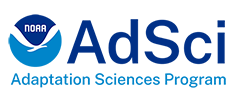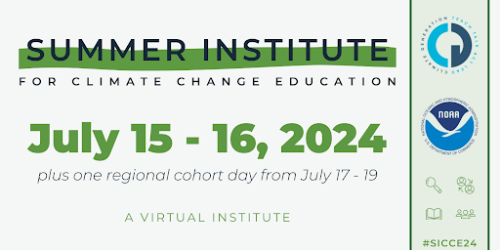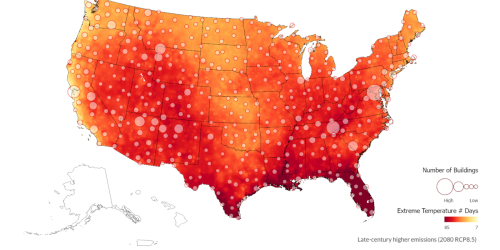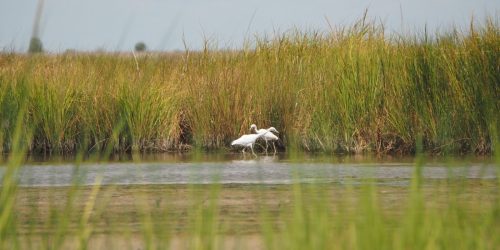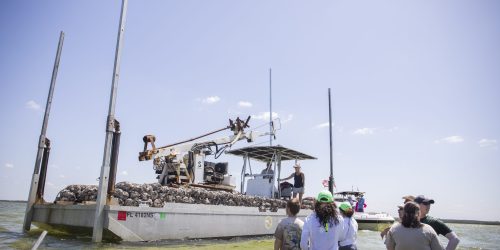CPO’s newly launched Adaptation Sciences (AdSci) Program is announcing 20 new 2-year projects in Fiscal Year 2021 focused on vulnerable U.S. coastal communities planning for the future impacts of flooding in the context of climate change and other stressors. The competitively selected projects total $4,846,215 in grants1.
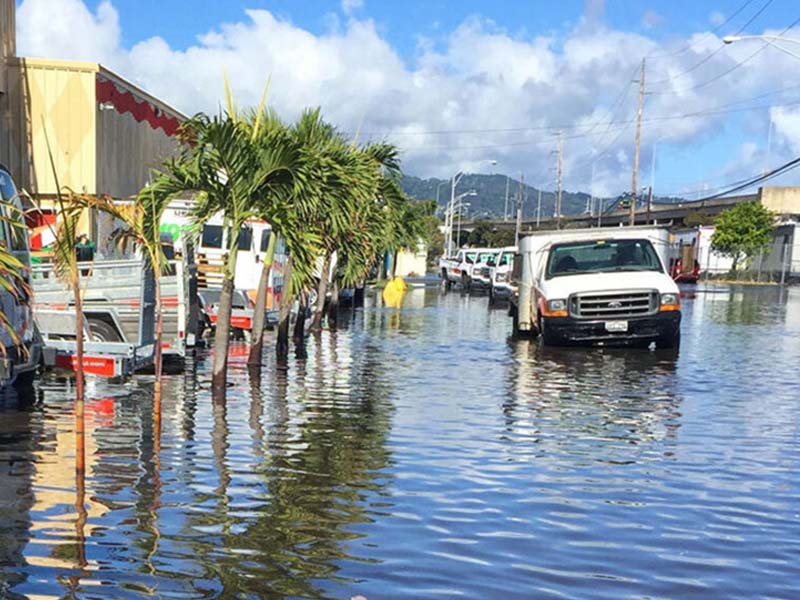
Coastal communities are already experiencing impacts from increased coastal flooding and other compounding risks, such as extreme events and conditions associated with the COVID-19 pandemic. These impacts disproportionately affect more vulnerable coastal populations, many of which face barriers to implementing new strategies for addressing climate-related risks comprehensively. To address this need, CPO’s new AdSci Program, launched in 2021, is funding new research projects that will accelerate, expand, and enhance the effectiveness and scale of adaptation and resilience planning and implementation in the face of complex coastal challenges through collaborative science, engagement, and innovation.
CPO’s Climate and Societal Interactions (CSI) Division launched the AdSci research program in response to the rapidly increasing demand for methods to advance climate adaptation and resilience strategies, and leverage NOAA sciences and services. The Program will help advance the knowledge, methods, and frameworks needed to move society beyond incremental adaptation toward more widespread, connected, adaptive pathways, and resilience strategies with clear economic and societal co-benefits. Research will focus on the integration of acute and chronic stressors that occur over multiple timescales.
For FY21, AdSci specifically encouraged proposals that focused on climate-sensitive flooding and related impacts in areas with vulnerable populations. These advances will also support the goals of CPO’s initiative to apply its core capabilities and align investments with partners in a set of climate-related risk areas, including coastal inundation.
The 20 new projects2 funded by the AdSci program in FY21 are:
- Measuring and Modeling the Resilience to Floods of Coastal Communities in Louisiana
This project seeks to test, validate, and improve index measures of community economic resilience in coastal Louisiana in order to enhance their policy relevance. Specifically, they will provide validated, enhanced measures of community-level economic vulnerability/resilience developed in conjunction with local partners with a focus on policy relevance and information that can be used to enhance community-level resilience in the face of climate and other environmental changes in a region facing multiple stochastic shocks and long-term stressors.- Lead PI: Craig Bond, Rand Corporation
- Co-PI: Melissa Finucane, Rand Corporation
- Harvesting Manoomin as a Climate Adaptation and Resilience Strategy in the Lake Superior Region
Manoomin (Ojibwe) or Psiŋ (Dakota) (wild rice) is an ecological and cultural keystone species across the western Great Lakes, a shallow water plant that provides a critically important food resource for human and wildlife communities. This grant’s collaborative approach to research and acknowledging different ways of knowing will expand upon climate adaptation efforts led by tribal nations in the region. A specific focus on relationship building and resilience learning to advance climate adaptation strategies will benefit the scientific community and the general public in the Gichigami and Great Lakes regions.- Lead PI: Mae Davenport, University of Minnesota
- Co-PI: Kristen Blann, The Nature Conservancy
- Engaging Transient Populations in Climate Preparedness and Coastal Resiliency Initiatives in Cape Cod, Massachusetts
The principal investigators will engage transient people (i.e., homeless citizens and seasonal international visa workers) as climate knowledge producers to learn what they know about and how they prepare for and recover from extreme climatic events, potentially revealing new information that can contribute to resilience planning for all citizens.The research will also fill knowledge gaps in academic literature around the climate vulnerability of marginalized populations and contribute to transdisciplinary discourse on engaging underrepresented communities in climate preparedness planning.- Lead PI: Ellen Douglas, University of Massachusetts – Boston
- Co-PIs: Rosalyn Negrón, University of Massachusetts Boston; Mark Borrelli, Provincetown Center for Coastal Studies
- Identification of Cost-Effective, Climate-Informed Green Infrastructure Adaptations to Reduce Flood Risk in Houston’s Vulnerable Communities
This project will identify and quantify opportunities for climate-informed adaptations to reduce flood risk in Houston’s vulnerable neighborhoods. These neighborhoods often contain oil refineries and petrochemical companies. The project will work with and provide stakeholders with a feasible green infrastructure-based flood reduction plan that integrates water resources, urban planning, and sociology concerns in a convergent manner.- Lead PI: Jessica Eisma, University of Texas-Arlington
- Co-PIs: University of Texas-Arlington Co-PIs: Michelle Hummel, David Coursey – UTA; Siddharth Saksena (VA Tech, Dominic Boyer (Rice)
- Collaborators: Harris County Flood Control District (Stephen Benigno; City of Houston Office of the Mayor (Marissa Aho and Laura Patiño); Community Design Resource Center at University of Houston (Susan Rogers); Northeast Houston Redevelopment Council (Keith Downey and Huey German-Wilson); University of Central Florida (Claire Knox); Streamline Technologies, FL (Peter Singhofen)
- Trust and Community Acceptance of Coastal Flood Mitigation
This project will provide methods to test hypotheses about the drivers of adaptation response in the context of coastal flooding management. They will design game theory-based experiments and surveys to measure how much trust individuals have in institutions who are involved in coastal flooding mitigation projects due to sea level rise. They will test if more trust leads to more acceptance of projects meant to adapt to climate change and how these institutions can build more trust- Lead PI: Melissa Haeffner, Portland State University
- Co-PIs: Sahan Dissanayake and J Forest Williams (Portland State)
- Advancing Scale-Appropriate Climate Resilience: The New Hampshire Coastal Neighbors Technical Assistance Program (N-TAP)
This project focuses in New Hampshire and will focus on how a neighborhood-scale, peer-to-peer technical assistance approach to future coastal flood risk assessments and resilience planning influence knowledge, confidence, engagement, networks, and actions among coastal residents at risk of sea-level rise and coastal flooding.- Lead PI: Kirsten Howard, New Hampshire Department of Environmental Services
- Planning a Flood Resilient Future for New Orleans, LA
Work with the Sewerage and Water Board of New Orleans to better understand the geographical and temporal variability in rainfall, flooding, and systematic redistribution of residents across the city. This work will contribute to a “once in a generation” effort to develop a master plan to prioritize water infrastructure investments over the next 50 years.- Lead PI: Barry Keim, Louisiana State University
- Co-PIs: Vincent Brown and Alex Haberlie (Louisiana State University); Amanda Lewis (Louisiana State University and Southern Climate Impacts Planning Program); and Wanyun Shao, University of Alabama
- Staying Afloat: Assessing the Long-Term Financial Impacts of Sea-Level Rise Adaptation Solutions in a Historic Coastal Community (Crisfield, MD)
Assess the long-term financial impacts of a variety of coastal climate adaptation solutions to inform long-term sea level rise planning in a rural, coastal landscape: Crisfield, Maryland. They will conduct a sea level rise vulnerability assessment to inform the strategic implementation of climate adaptation strategies based on the strategy sustainability, community flood-risk reduction benefits, and long-term financial impacts. The project aims to provide rural communities, such as Crisfield, with the tools and data necessary to make financially and socially responsible decisions for adapting to climate-induced flooding from sea level rise, storms, and precipitation- Lead PIs: Kelly Leo, Nature Conservancy; Jennifer Egan, University of Maryland, Finance Center; Celso Ferreira, George Mason University
- Studying How Things Fall Apart: Exploring Municipal Services System Failures to Help Develop Science-Based Decision-Points in South Carolina Coastal Communities
This project aims to help Beaufort County, South Carolina rethink their approach to sea level rise and related flooding, planning and preparedness by going below ground. The initial goal will be to understand the current volume and salinization challenges on groundwater, identify when impacts to infrastructure or economy, such as agriculture, will occur based on sea level rise projections, and ascertain when implementation needs to begin so projects are complete by the time impacts are routine. Ultimately, the PIs hope to obtain an understanding of the trigger points that will allow the County to chart a course for adaptation which will provide a standard for similar counties.- Lead PI: Susan Lovelace, South Carolina Sea Grant Consortium
- Co-PIs: Sarah Watson, Landon Knappm, and Matthew Gorstein (South Carolina Sea Grant Consortium); Matthew Nowlin and Norm Levine (College of Charleston); Alicia Wilson and Kirstin Dow (University of South Carolina); Abi Locatis Prochaska (South Carolina Dept. of Natural Resources); and Robert Merchant (Beaufort County Community Development)
- From Land to Sea: Learning from Indigenous and Local Knowledges to Co-create Climate Adaptation Metrics
The survival of Indigenous and other frontline communities has long depended on recognizing indicators such as weather patterns and plant and animal behavior. In recent decades there have been discernible shifts in the ability to predict events. The PIs will incorporate features of indigenous understandings into planning, working with indigenous groups in California, Louisiana, Hawaii and Puerto Rico. The project will bring scientists and indigenous communities together to share their knowledge. They will build on existing networks that they have already developed to bring people together to consider the different metrics and other data that NOAA uses to understand coastal hazards and what indigenous metrics and other data can be used to orient experience toward achieving socio-ecological well-being.- Lead PI: Julie Maldonado, Livelihoods Knowledge Exchange Network
- Enhancing Community Resilience to Sea Level Rise with an Integrated Geospatial/Policy
This project will focus on collaborative engagement with rural localities with low income, minority and tribal communities to design an innovative long-term adaptation approach through a comprehensive, multi-faceted, geospatial analysis of vulnerabilities to flooding and assessment of low cost-community based adaptation strategies. Researchers will work with decision-makers in the communities to develop long term adaptation strategies that emphasize the use of low-cost and community-centric adaptation approaches to flood impacts that leverage natural settings, provide policy solutions, and respect cultural concerns. The project will synthesize information from disparate, but topically related, efforts into a single geospatial analysis to identify the current threats to resilience and assess the longevity of potential adaptation strategies.- Lead PI: Molly Mitchell, Virginia Institute of Marine Science
- Co-PIs: Pamela Mason, Donna Marie Bilkovic, and Robert Isdell (Virginia Institute of Marine Science); and Elizabeth Andrews (William & Mary Law School)
- Connecting Upstream & Downstream Communities: A Methodology to Collaboratively Build Resilience in the Darby Cobbs Watershed, Pennsylvania
This project will utilize participatory systems modeling to build climate adaptation capacity in the Darby Cobbs watershed of southeastern Pennsylvania, near Philadelphia, with a focus on green infrastructure, a resilience strategy with many co-benefits including flood risk reduction.This area has a history of flooding in the lower watershed which is characterized by being heavily urbanized, lower incomes, and a Black environmental community as well as a lower-lying area, with filled in wetlands, and impacted by fluvial flow and coastal water levels. In the last 10 years, there has been much discussion but no solutions. This effort would build off of past work, especially a NOAA Climate Program Office Coastal and Ocean Climate Applications (COCA) program/Sectoral Applications Research Program (SARP) grant which is engaging the lower watershed community and built a hydraulic-hydrologic model for the whole watershed.- Lead PI: Franco Montalto, Drexel University
- Co-PIs: Howard Neukrug, University of Pennsylvania and William Solecki, City University of New York-Hunter College
- Understanding Current and Future Coastal Flood Risk: How do Local Governance Networks Shape Resilience Efforts in Response to Perceived Hazards?
The project will focus on the communities of the US Gulf Coast, specifically Southeast Texas and Weeks Bay, Alabama. The investigators will use sophisticated flood modeling approaches, coupled with vulnerability and governance models, to demonstrate where communication challenges could be overcome with additional knowledge on perceptions and goals of the parties involved. They will use a systematic process for defining the challenges based on cognitive mapping and connecting these results to governance structure.- Lead PIs: Paola Passalacqua, The University of Texas at Austin; Hamed Moftakhari, University of Alabama
- Co-PIs: R. Patrick Bixler and John Swartz (The University of Texas at Austin); Liv Haselbach (Lamar University); Hamed Moftakhari (University of Alabama)
- Increasing Massachusetts Coastal Adaptive Capacity and Community Resilience to Sea Level Rise
This project focuses on the vulnerability of salt marshes in Massachusetts to sea level rise (SLR). The team is led by Mass Audubon with support from Boston University faculty. The activities consist of modeling SLR impacts using the SLAMM model, field surveys in the selected sites, and adaptation support for participating communities. The results of this work will provide more refined information for natural infrastructure planning. In addition, there will be a high school internship program, targeting under-represented students, and surveys will be conducted at the end of the project to evaluate outcomes. The specific sites selected are Newburyport, Wareham, Dartmouth, Marshfield, and Barnstable.- Lead PI: Danielle Perry, Massachusetts Audubon Society Inc
- Advancing Climate Adaptation and Coastal Community Resilience to Flooding in Hawaiʻi
Working from two recently developed resilience plans, one from the Native Hawaiian group Waiehu Kao (WK)—which has included projections for climate change in its plan—and the other from the Hawaiian Islands Land Trust (HILT), the investigators seek to reduce flood risks and hazards to a stretch of Hawaiian coastline in ways that respect local cultural values and incorporate the importance of nearshore ecosystems in WK history.- Lead PI: Noelani Puniwai, University of Hawai’i
- Co-PIs: Daniel Ornellas, State of Hawaiʻi Department of Land and Natural Resources; Chris Shuler, University of Hawai’i; Scott Fisher, Hawaiian Islands Land Trust; Roy Olivera, Waiehu Kou III Association; and Kekai Robinson, l Ke Kula ʻO Piʻilani (school)
- Collaborative Modeling the Benefits, Consequences, and Trade-offs of Mangroves and Seawalls for Coastal Communities
The overarching research question of this grant is: How do diverse stakeholders, from empowered decision-makers to vulnerable groups impacted by decisions, perceive and prioritize the benefits, consequences, and trade-offs of shoreline social-ecological systems and hazard adaptation decisions? This work promises to demonstrate a way to study the communication dynamics around potentially contentious choices for hazard mitigation and use these observations to improve messaging, mutual trust and collaborative potential in the selection of development solutions.- Lead PI: Steven Scyphers, Northeastern University
- Co-PIs: Steven Gray, Michigan State University; Christine Shepard, The Nature Conservancy, Gulf of Mexico Program; Chris Bergh, The Nature Conservancy, Florida Chapter; Randall Hughes, Northeastern University; Sharon Harlan, Northeastern University
- Federal and other Non-funded Co-PIs: Tori Tomiczek, United States Naval Academy; Jennifer Helgeson, National Institute of Standards and Technology; and Alison Higgins, Office of Sustainability, City of Key West, Key West, FL
- The Resilient305 Collaborative: Advancing Hyperlocal, Replicable, Impact-driven, Adaptation Science through Resilience Learning
The PIs will leverage the Resilent305 Collaborative to implement community-engaged research, with an iterative co-design/co-production approach, that advances hyperlocal, impact driven adaptation science to inform a Resilience Learning System replicable in other coastal metropolitan areas. They hypothesize that co-design/co-production of flood resilience actions (e.g., projects, programs, and policies) driven by community priorities, comprehensive metrics and resilience learning will yield cross-sectoral, quality of life benefits of flood resilience investments and in turn, more effective resilience strategies.- Lead PIs: Tiffany Troxler, The Florida International University Board of Trustees; and Amy Clement, University of Miami
- Co-PIs: Jayantha Obeysekera, Maria Ilcheva, Edward Murray, and Susan Jacobson (Florida International University); William Solecki and Erin Friedman (City University of New York, Hunter College); James Murley (Miami-Dade County); Scot Evans and Katharine Mach (University of Miami)
1 The funding will be distributed over the life of the projects and future-year funding is conditional on appropriations.
2 At the time of publication, all awards may not have been accepted by recipient institutions


